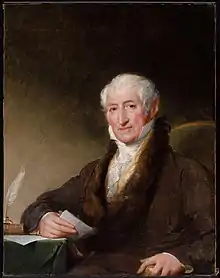Hallowell family
The Hallowell family is an American family from Philadelphia and Boston, notable for their activism in the abolitionist movement and for their philanthropy to various universities and civil rights organizations.[1] [2][3] The Hallowell family is frequently associated with Boston Brahmin culture.[4][5]
Notable members
Benjamin Hallowell Carew: His mother, Mary (Boylston) Hallowell, was the daughter of Thomas Boylston, and a first cousin of Susanna Boylston, the mother of the 2nd President of the United States, John Adams, and grandmother of the 6th President, John Quincy Adams. He was a brother of Ward Nicholas Boylston and a nephew of Governor Moses Gill.[6] In 1828, Sir Benjamin Hallowell succeeded to the estates of the Carew family of Beddington, Surrey, on the death of his cousin, who had herself inherited them from her brother-in-law. In accordance with the terms of her will, he assumed the Carew name and coat of arms, becoming known as Admiral Sir Benjamin Hallowell Carew.[7]
Ward Nicholas Boylston: A merchant and benefactor of Harvard. The Town of Boylston, Massachusetts as well as Boylston Street in Boston and in Jamaica Plane are named for him.[8][9]
Benjamin Hallowell: A Boston merchant and one of the Kennebec Proprietors, holders of land originally granted to the Plymouth Company by the British monarchy in the 1620s. The city of Hallowell, Maine is named for him.[10]

Morris Longstreth Hallowell: He was born in Pennsylvania where he inherited and successfully ran a China import trade business. Hallowell became a director of the Pennsylvania Railroad and the First National Bank. His summer home was a stop on the underground railroad. He was a founding member of the Union League of Philadelphia.[11]
May Hallowell Loud: Artist, suffragist and great granddaughter of Lucretia Mott.
Sarah Catherine Fraley Hallowell
Sarah Tyson Hallowell: An American art curator, quaker, and granddaughter of Elisha Tyson.[12]
Edward Hallowell (herpetologist)
Norwood Penrose Hallowell: A colonel in the 54th Massachusetts regiment.[13] In the Civil War Film, Glory (1989 film), Norwood Penrose Hallowell and his brother were recreated as the fictional character, Major Cabot-Forbes, portrayed by actor Cary Elwes.[14][15] He died in 1914 and was buried in Mount Auburn Cemetery.
Edward Needles Hallowell: An officer in the 54th Massachusetts Volunteer Infantry Regiment.[16]
References
- Roberts, Ellwood (1904). Biographical Annals of Montgomery County, Pennsylvania, Containing Genealogical Records of Representative Families, Including Many of the Early Settlers and Biographical Sketches of Prominent Citizens. T. S. Benham.
- A Record of the Streets, Alleys, Places, Etc. in the City of Boston. City of Boston Printing Department. 1910.
- Column, Lydia Doskocil Guest. "The history behind Boylston's name". telegram.com. Retrieved 2020-04-26.
- Hallowell, William Penrose (1893). Record of a branch of the Hallowell family, including the Longstreth, Penrose, and Norwood branches. New York Public Library. Philadelphia, Hallowell.
- "The New Brahmins". Boston Magazine. 2006-05-15. Retrieved 2020-04-26.
- "Boylston Family Papers, 1688-1979". www.masshist.org. Retrieved 2020-04-26.
- "Peking Gazette clippings (1828)". Translations of the Peking Gazette Online. Retrieved 2020-12-24.
- Column, Lydia Doskocil Guest. "The history behind Boylston's name". telegram.com. Retrieved 2020-04-26.
- A Record of the Streets, Alleys, Places, Etc. in the City of Boston. City of Boston Printing Department. 1910.
- "About Hallowell - Hallowell, ME". hallowell.govoffice.com. Retrieved 2020-08-16.
- Leach, Josiah Granville (1903). History of the Penrose Family of Philadelphia. private circulation.
- Lapsansky, Emma Jones (2003-01-26). Quaker Aesthetics: Reflections on a Quaker Ethic in American Design and Consumption, 1720-1920. University of Pennsylvania Press. ISBN 978-0-8122-3692-7.
- "Fifteen Minutes: The Old Boys' Clubs | Magazine | The Harvard Crimson". www.thecrimson.com. Retrieved 2020-04-29.
- Anderson, John (September 2019). "Medford Historical Society and Museum Newsletter" (PDF). Medford Historical. Retrieved 26 April 2020.
- www.americaninno.com https://www.americaninno.com/boston/inside-the-most-elite-old-boys-clubs-in-boston/. Retrieved 2020-04-26. Missing or empty
|title=(help) - Feliz, Elyce (2014-07-26). "The Civil War of the United States: Edward Needles Hallowell, died July 26, 1871". The Civil War of the United States. Retrieved 2020-04-26.
